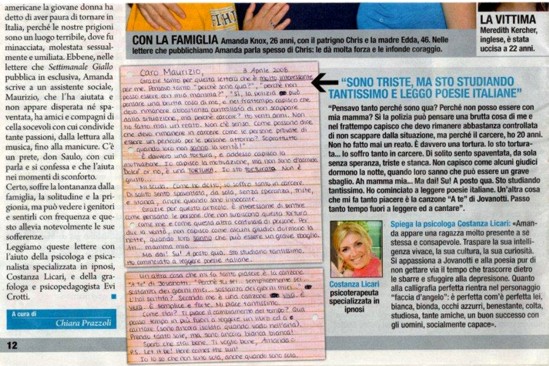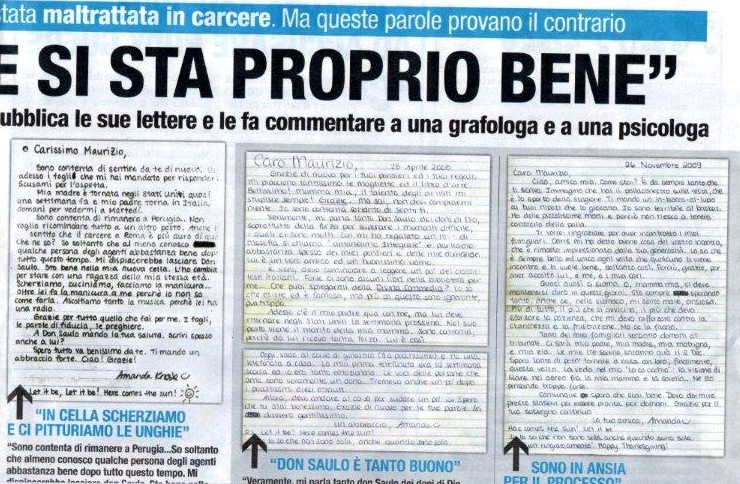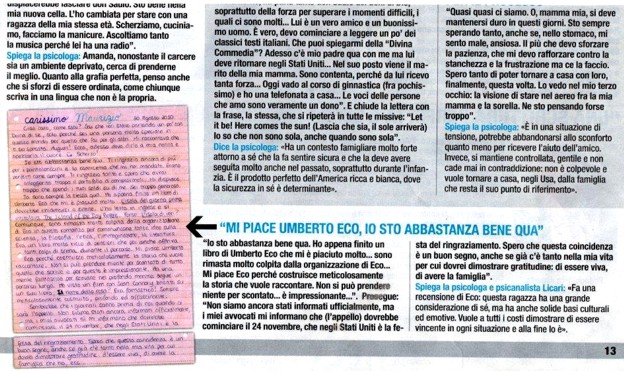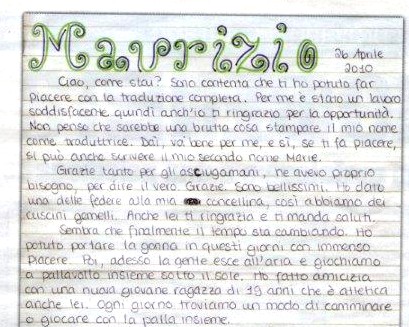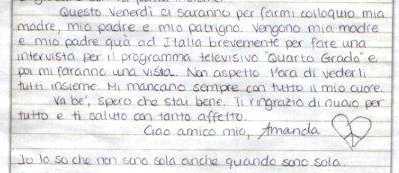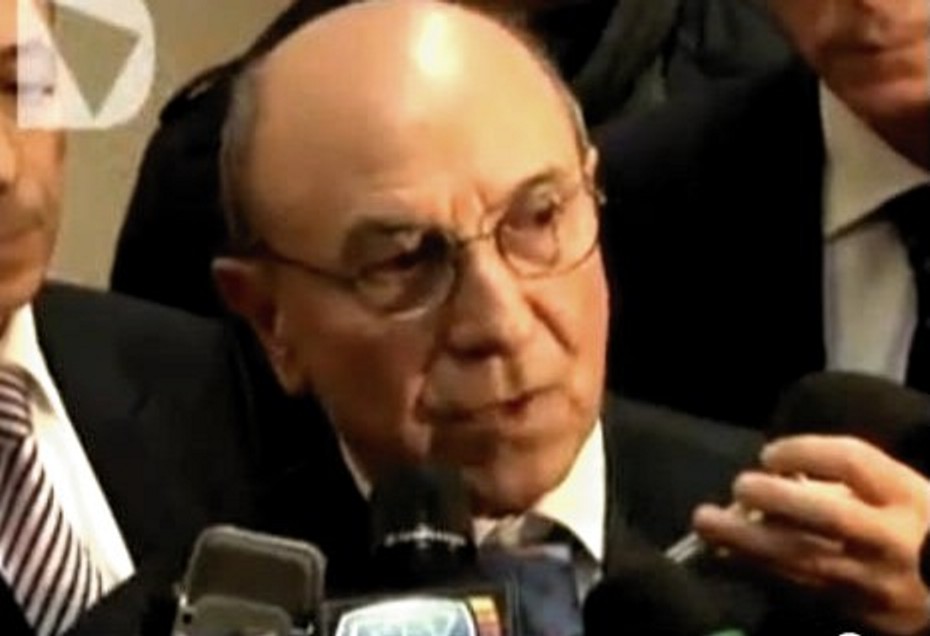
Category: 9 Mignini v Knox hoax
Tuesday, May 28, 2013
Demonizations By Knox: Knox Lacks Hard Proof; Sparks Widespread Anger & Contempt
Posted by Miriam
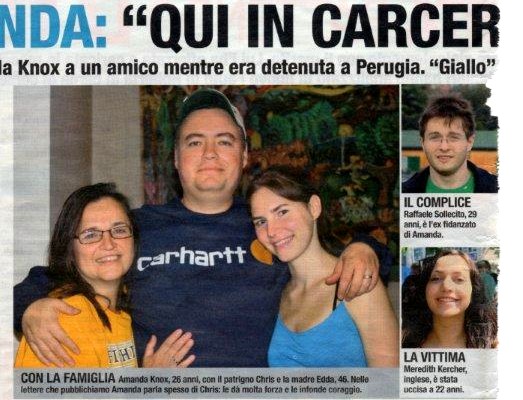
[Header of the Giallo article; the rest off it is at bottom; click for a larger image]
1. The Fake Knox In Her Demonizing Book
Amanda Knox may have felt she was “waiting to be heard” in America but here in Italy we have heard her many times, and we feel we know her pretty well.
Her book and interviews don’t sound like her at all. They sound like nasty legal stunts and nasty PR at work. It is easy to disprove her disparagement of officials and her friends here, and an investigation by the Chief Prosecutor in Bergamo is already under way.
So the big question for us here is not angrily “Who are these appalling police, prosecutor and prison officials, and why did they do these terrible thing?” but sadly “Why was she compelled to invent all this stuff?” and “Why is she so scared to come back?”
2. The Amanda Knox That We In Italy Know
I have translated six of her letters from prison just published in the crime magazine Giallo plus the introduction and the graphologist’s analysis. This is more like the Amanda Knox we know, not the invented one in the book.
1. The Giallo magazine’s Introductory framing of Knox’s letter below
Amanda: “Here In Prison Things Are Okay”
So writes Knox to a friend while she was a prisoner in Perugia. [The true crime magazine] Giallo publishes her letters, and then has them commented on by a graphologist and a psychologist
The letters you see published on these pages are from Amanda Knox, the young American accused, along with her ex boyfriend Raffaele Sollecito, of the murder of the British student Meredith Kercher, that took place in Perugia the 1st of Nov. 2007.
Knox, 26 years old, was acquitted in appeal, but now Cassazione has decided that the appeal must be redone. While waiting for this complicated judicial process to restart, Amanda lives in Seattle, and is traveling around America to launch her new book Waiting to be Heard for which she was paid several million euro by her publisher.
To the American television interviewers, the young American woman has said she is scared of coming back to Italy, because our prisons are terrible places, where she was threatened, molested sexually, and humiliated.
Well, in the letters that Giallo publishes in an exclusive, Amanda writes to a social worker, Maurizio, who helped her, and she seems neither desperate or scared, she has friends and cellmates with which to share many interests, From reading to music, up to manicures. There is a priest, Don Saulo, with which she talks, and confesses, and helps her in her moments of discouragement.
Sure, she suffers from the distance from her family, her loneliness and her imprisonment, but she can see her parents and speak with them frequently, and this notably relieves her suffering.
2. Six letters from Knox to the social worker Maurizio 2008-2010
April 3 2008
Dear Maurizio,
Thank you very much for that letter that for me is very interesting. I was thinking: “Why am I here?”, “why can’t I be with my mother?”, ” Yes the police can think badly about me, and meanwhile I do understand that I have to be in control, not run away from the situation, but why prison? I am 20 years old, never committed a crime, it is senseless. How can they say that I have to stay in prison like the people that can be a danger to others? Above all when they don’t know the truth?
It really is a torture and now I understand the motivation. I understand the motivation, but I do not agree. “Sweet” or not it is a “TORTURE”. I am being tortured and it is not right…...
Sorry. As I said I do suffer a lot in prison. Generally I am scared, alone, with no hope, sad, and tired, even if I am innocent.
Thank you for the article. It is interesting to know how people that do not undergo this torture as I and hundreds others think. To tell you the truth, I can’t understand how some judges can sleep at night, when they very well know that it can be a grave mistake. ah… mamma mia….
Come on! It is O.K. here. I am studying a lot and have started reading Italian Poetry.
Another thing that I like a lot is the song “A te” by Jovanotti. “perché tu sei…semplicemente sei….sostanza dei giorni miei…sostanza dei giorni miei…. (lyric of the song n.d.r.). Have you heard it? According to me it is a live song. It is true. Simple and strong. I like it a lot.
How are you? Do you like the change of weather? I spend more time outside reading a book and singing (I am still alone when I go outside). I am sun tanning but I’m still white white!
Hope you are OK. Love, Amanda
P.S. Let it be! Here comes the sun! I know that I am not alone, even when I am alone
April 28 2008
Dear Maurizo,
Thanks again for your thoughts and your gifts.
I really like the T-shirts and the book of art. Beautiful! Mamma mia the talent of the artists always surprises me! Thanks. But you know, you do not have to buy me anything. I am happy just to hear from you.
Really, [Priest] Don Saulo speaks to me so much about God’s gifts, especially about the strength to overcome the difficult moments, of which there are so many. He bought me a book on philosophy entitled “Umanesimo Integrale” and we speak often of my thoughts and my questions. He is a true friend and a very good man.
It’s true, I must start to read a bit of classic Italian texts. Maybe there are some books in the library for me….......Who can explain to me about “Divina Commedia”? I know it exists and that it is famous, but more than that I am ignorant, unfortunately.
Now my father is here with me, but he has to return to the United States, next week. In his place the husband of my mother, will come. I am happy, because from him I receive a lot of strength. He is like that.
Today I go to the gym course (in a bit) and I have a home telephone call. My first telephone call was last week and I was so excited. The voices of the people I love are really a gift. I trembled a bit after those so little ten minutes.
Now, I must go to the course to sweat a bit. 😊 I hope you are very well. Thanks again for your words.You are very kind.
A hug, Amanda 😊
P.S. Let it be! Here comes the sun! I know I am not alone, even when I’m alone.
November 26 2009
Caro Maurizio,
Ciao, my friend. How are you? It’s from forever that I write you. I imagine that you must have basketball in your head, since it is the season’s sport. I send best wishes to your nephews, who play it. I am terrible at basket. I have very small hands, therefore I can’t control the ball.
I would like to thank you for meeting with my family. Chris told me nice things about your encounter, he was impressed by your generosity. I know that it is always nice and unique, every time that somebody comes toward you and they like you, just like that. Therefore, thank you, for having welcomed him, me and my dear ones.
Nearly, nearly there. O mamma mia, one has to remain strong in these days. I am always hoping so much, even if, in my stomach I feel sick, anxious. More than anything, the closer it gets, the more I have to reinforce my patience against the fatigue and frustration. But I will make it.
A lot of my family will come tomorrow to be in court. There will be my father, my mother, my stepmother and my aunt. My three sisters will be here on Dec. 2. I hope so much to be able to go home with them, finally, this time. I see it in “my third eye” the vision of being on the plane between my mother and my sister. Maybe, I am thinking to much about it.
Anyway, I hope you are well. I must go to sleep early tonight, to be ready for tomorrow.
Thank you for your continued support.
Your friend, Amanda 😊
Here comes the sun! Let it be! I know that I am not alone even when I am alone,
Happy Thanksgiving!
April 20 2010
MAURIZIO
Hi! How are you? I’m happy that I made you happy with the full translation. For me it was a satisfying job, so I thank you too for the chance that you gave me. I don’t think it will be a bad thing put up my name as a translator. OK it is fine for me and yes if you like it, you can even put my second name Marie,
Thank you very much for the towels, to be truthful I really needed them. They are beautiful. I gave one of my pillow cases to the other inmate so we have twin pillows. She thanks you too and sends her best wishes.
Seems like that the weather is finally changing. With great pleasure I was able to wear a skirt in these days. Now people are out and we play volleyball together under the sun. I made friends with a new 19 years old girl: she is an athlete too. Every day we walk or play with the ball together,
Next Friday my mother, father and stepfather will be here for a visit. Mi mother and father are here for a short time to be interviewed on TV at “Quarto Grado” and then will come here. Can’t wait to see them, I miss them with all my heart.
Well, hope that you are fine. Thank you again for everything and salute you with all my affection
Hi your friend, Amanda
I know that I am not alone even when I am alone
August, 30 2010
Dearest Maurizio
Hi dear, how are you? Do you know that yesterday I was taking with D…. about you, only because you are a very special person in this world, for all that you do for others. She told me that you got married. Congratulations! Now I have to tell to my grandmother and break her heart! 😊 Just joking!
I am well enough here. I thank you again for the shorts and shirt that you send me. They were perfect as always. Thanks and I hope that you didn’t lighten your wallet too much. I am kind of disappointed that you spend your money on me, you are too generous. I am always the same here.
Just finished reading a book by Umberto Eco book that I liked a lot. In Italian should be ” L’isola del giorno prima”, I read it in English “The island of the day before”; maybe the “island of yesterday”? Anyway, I was favorably moved by Eco’s organization in this novel in order to communicate so many ideas on science, philosophy, ethic, imagination, literature. It was a book very rich on thoughts, and colpi di scena during it’s path.
I like Umberto Eco because he meticulously builds the story that he wants to tell. Of all he writes, nothing is taken for granted and this is remarkable, he has a fantastic mind to dig deep while following a long track. I saw a Sean Connery movie based on a book of his “Il nome della Rosa?” It was fantastic. Always meticulously built, deep and fascinating.
Seems like that the newspapers know before us when the appeal proceeding will take place. We still have not been officially notified, but my lawyers told me that it should start Nov. 24th; that in the USA is Thanksgiving Day. Hope that it is a good omen even if there is a lot in my life for which I should be grateful: to be alive, having the family that I have etc…
[Undated letter]
Dearest Maurizio,
I am happy to hear from you again. I use now the paper you sent me to answer you. Sorry to make you wait. My mother has returned to the United States nearly a week ago, and my father returns to Italy tomorrow, to see me Tuesday.
I am happy to remain in Perugia. I do not want to restart everything in another place. Also I? (blurred) have heard that the prisons in Rome are harsher than here. Who knows?
I only know that at least I know some of the prison officers fairly well, after all this time. I would be sorry to leave Don Saulo. I feel fine in my new cell. I changed it so I could be with a girl my own age. We joke, cook, we do manicures. Further, she does a manicure for me, because I do not know how to do one. We listen to music a lot because she has a radio.
Thank you for all you do for me. The paper, your words of confidence, your prayers. To Don Saulo I will send your greetings. Do you write often to him too? I hope all is very well with you. I send you a big hug. Ciao! Thank you!
Amanda Knox 😊
Let it be, Let it be! Here comes the sun! (drawing of a sun)
3. Comments by educational psychologist and graphologist Evi Crotti
Looking at the Amanda Knox letters it is evident right away how organized and precise she is: she has a perfect handwriting, elegant and without smudges. We try to interpret it with the help of the graphologist and educational psychologist Evi Crotti.
She explains: Her perfect, organized handwriting, without margins and few spaces indicates that we have before us a girl that is decisive, strong, who wants to dominate, and knows she can succeed in life. She puts herself In the center and leaves no place for others. Amanda displays a way of writing that is typically northamerican, in small print, called script.
The handwriting, elegant, big and curved, reveals an extroverted personality, and with a notable sense of taste. Her language is fluid and polished, and the accuracy with which she writes, tells us that this young girl has a need to maximize and nurse her image, to the point of becoming narcissistic: after her signature she draws herself with a smiling face.
Amanda leaves no space between the lines: this signifies an element of interior loneliness, which she attempts to compensate at any cost with approaches of verbal intrusiveness. This tells us that that her strong narcissistic behavior can escape control and lead her to present unstable behaviors. The fact instead that her handwriting is always in horizontal lines, without blurs, gives testimony to her practical intelligence and her strong tenaciousness, that allow her to reach her goals.
Also, the handwriting is rigid and this signifies that she knows how to use words with care and determination. Evi Crotti underlines that the handwriting is static: It is a sign of a behavior that is very seductive. Attention, the need to be attractive at all costs can make her lose sight of the objectivity of judgment , taking her to a subjective vision of circumstance reality.
Conclusion: Amanda seems to be in a continuous search of approval and acceptance from those who live around her. Her egocentricity, maybe pushed unto the point of a bogus personality, demonstrates that this girl possess a highly emotional immaturity that doesn’t allows her to love in an unselfish way. The handwriting slightly slanted to the left indicates a contradiction between the need to be liked and the reactive refusal toward a feminine figure: for her, probably every woman represents a rival.
Sunday, May 12, 2013
With Diffamazione Complaint Against False Claims In Oggi Knox’s Legal Prospects Continue To Slide
Posted by Our Main Posters
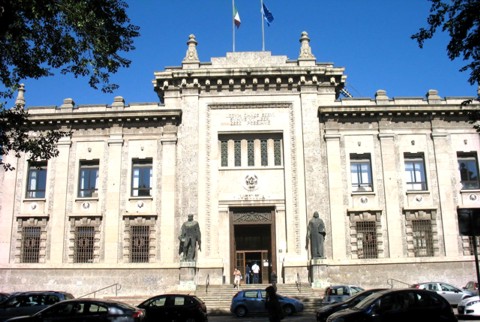
[Above: the Palace of Justice in Bergamo where Knox and Sollecito might spend some time]
Knox’s public relations campaign is starting to look very, very odd.
As many of our recent posts have explained, no really good lawyer in Italy would ever allow their clients to put out an inflammatory book while their legal process is still going on. It hasn’t happened in any other Italian cases in years.
And now in this case it has happened twice.
Sollecito’s book reeked of blood money, arrogance and contempt, it twisted and discounted much of the evidence, made claims which both Sollecito and others had previously contradicted, made accusations of criminal behavior against officers of the court, and separated himself from Knox.
Now guess what?
Despite the fact that Sollecito’s book was promptly dispatched to the Florence and Verona chief prosecutors with diffamazione and vilipendio complaints, Knox’s book too reeked of blood money, arrogance and contempt, it too twisted and discounted much of the evidence, it too made claims which both Knox and others had previously contradicted, it too made accusations of criminal behavior against officers of the court, and it separated her from her co-perp.
In each case there was a shadow writer, respectively Andrew Gumbel and Linda Kulman, who seem to have tired early on of the clients, as all their hired help tends to do, and simply copied the FOA playbook into the books with no sources at all checked beyond that narrow group.
To cool-headed and informed people who really know the case, Gumbel’s sources were rather a joke. PR shills Nina Burleigh and Candace Dempsey and Steve Moore? Really? And Linda Kulman seems to have fallen into the same trap.
This becomes very obvious when you watch the two “authors” at their interviews. They are both hampered and tongue-tied because for the life of them neither can remember what their shadow writers put in the books. Several interviewers have actually caught them out.
As we knew the Bergamo lawsuit against Oggi and Knox was headed down the pike, we set out what we consider to be the state of play last Friday. It still stands up, but might be embellished just a bit.
First, here is Andrea Vogt’s helpful description of what’s in the Bergamo complaint..
The 8-page complaint is addressed to the Prosecutor’s Office in Bergamo (near Milan), where the headquarters of the magazine are located. It cites as slanderous the suggestion that Knox was illegally interrogated and maintains that there is no trial or investigation documentation supporting a number of “affirmations that were never made.” Mignini insists Knox was initially heard by him as a witness with key information relevant to the murder of Meredith Kercher, not as a suspect herself.
“Knox never asked for an attorney. She wanted to talk,” Mignini wrote, adding that he did not contest her statements or question her at that time, because she was making a spontaneous declaration regarding Patrick Lumumba’s alleged involvement. [In other words, not about herself.]
The complaint also questions allegations of prison mistreatment and indicates specific persons and neutral institutions as having knowledge on the matter, including the Capanne prison chaplain, U.S. embassy officials, center-right politician Rocco Girlanda and secretary general of the Italy-USA Foundation Corrado Daclon, all of whom visited Knox regularly in prison.
Also contested are phrases reported by Oggi and attributed to Knox’s memoir claiming he had a bizarre past that included a conviction on abuse of office charges that was pending appeal, when in fact he was fully and definitively acquitted of those charges in 2011 by a Florence court.
Italy’s high court (Cassation) recently agreed with his office’s request to re-open the Monster of Florence/Narducci case, the complaint notes. That decision has lent new credence to his long-running investigation of the suspicious 1985 death of a Perugian doctor who some investigators believe was involved (Italy’s Cassation Court in March also ordered Mario Spezi, co-author of the Monster of Florence bestseller, to stand trial for allegedly attempting to pin the blame on another man).
While the targets of the suit are stated to be Oggi and Amanda Knox and her publishers, the REAL target appears set to be the FOA playbook as set out in Amanda Knox’s book. And for that matter in Raffaele Sollecito’s book.
The first complainant (there are expected to be others) Giuliano Mignini has advanced a request for a formidable slate of witnesses, which could come to include even the lawyers for Sollecito and Knox.
Won’t that be fun. As they are interrogated on the stand, each witness is going to have to take a position on what crazy stuff the FOA have pushed into the books.
Did the prosecutor offer Sollecito an illegal deal or not? Did Knox get interrogated about Patrick by the prosecutor while denying her a lawyer or not? Did Knox complain to her lawyers about conditions in prison and if so why do those lawyers and so many others say she did not?
And maybe fifty more sudden-death choices like the above. Gee thanks Oggi and Amanda Knox. This could set some facts straight, in front of the whole world.
Demonizations By Knox: OGGI Charged For Article Conveying False Claims To Italy #2
Posted by Our Main Posters

[Umberto Brindani, editor of Oggi, a Mario Spezi ally, being sued for publishing Knox’s claims in Italy]
The decision of Amanda Knox and her lawyers and publishers to flaunt her dishonest claims in Italy seems seriously ill advised.
Pouring gasoline on the fames, it has opened up a fast-track way for those many who she nastily attacks to put the real truths in front of the world. Nobody who foolishly parrots her will be immune from being required to testify by the courts, her own lawyers included.
Here are our own short rebuttals of the Knox claims Oggi specifically flaunts to Italy in its unresearched review.
- Knox was NOT interrogated for days and nights. She was put under no pressure in her brief witness interviews except possibly by Sollecito who had just called their latest alibi “a pack of lies”.
- Knox WAS officially investigated in depth, after she surprisingly “confessed” and placed herself and Patrick at the scene. Prior to that she’d been interviewed less than various others, who each had one consistent alibi.
- Knox herself pushed to make all three statements without a lawyer on the night of 5-6 November 2007 in which she claimed she went out from Sollecito’s house, met Patrick, and witnessed him killing Meredith.
- Far from Knox being denied a lawyer, discussions were stopped before the first statement and not resumed, in the later hearing she was formally warned she needed one; she signed a confirmation of this in front of witnesses.
- Prosecutor Mignini who Knox accuses of telling her a lawyer would hurt her prospects when she claims she asked for one was not even in the police station at that interview; he was at home.
- She was not prohibited from going to the bathroom. At trial, she testified she was treated well and was frequently offered refreshments. Her lawyers confirmed this was so.
- She was not given smacks by anyone. Over a dozen witnesses testified that she was treated well, broke into a conniption spontaneously, and thereafter was hard to stop talking.
- There is no evidence whatsoever that Knox was subject to “something similar to torture” and as mentioned above only Sollecito applied any pressure, not any of the police.
- There is nothing “suicidal” about returning to Italy to defend herself at the new appeal. Sollecito did. She risks an international arrest warrant and extradition if she doesn’t.
- There is no proof except for her own claims of sexual molestations in prison; she is a known serial liar; and she stands out for an extreme willingness to talk and write about sex.
- Many people have testified she was treated well in prison: her own lawyers, a member of parliament, and visitors from the US Embassy were among them; she herself wrote that it was okay.
- She may have based her account on her diaries and “prodigious memory” but the obviously false accusation against the prosecutor suggests that much of the book was made up.
- The investigators had a great deal of evidence against Knox in hand, not nothing, and they were not ever faulted for any action; they helped to put on a formidable case at trial in 2009.
- “Police and Italian justice work with such incompetence, ferocity, and disdain for the truth” is contradicted by a very complete record prior to trial which was praised by the Supreme Court.
- Mr Mignini has NO bizarre past at all. He is widely known to be careful and fair. He would not have been just promoted to first Deputy Prosecutor General of Umbria otherwise.
- He was put on trial by a rogue prosecutor desperate to protect his own back from Mignini’s investigations; the Supreme Court has killed the trumped up case dead.
- There was nothing “mysterious” about Knox being taken to the crime scene to see if any knives were gone, but her wailing panic when she saw the knives was really “mysterious”.
- Knox never thought she was in prison for her own protection; she had signed an agreement at the 5:00 am interview confirming she did know why she was being held.
- Monica Napoleoni did not “bluff” that Sollecito had just trashed their joint alibi; he actually did so, because his phone records incriminated him; he agreed to that in writing.
- There was no crescendo of “yelling and intimidations that lasts from 11 at night until 5.45”. There were two relatively brief sessions. Knox did most of the talking, named seven possible perps, and drew maps.
- There was zero legal requirement to record the recap/summary interview, no recording has “gone missing” and many officers present testified to a single “truth” about what happened.
Demonizations By Knox: OGGI Charged For Article Conveying False Claims To Italy #1
Posted by Our Main Posters

The popular Italian magazine Oggi was sent a review copy of Knox’s book by somebody in the United States.
Oggi has been a frequent vehicle for the Knox entourage version of events, and it has carried a number of lurid pro-Knox splashes. The magazine has a long history of nasty jabs at prosecution and police who as career civil servants under unusually strong rules have no easy ways of explaining their side.
Like all of Oggi’s articles on the case, this shrill and foolish piece is totally one-sided and absolutely unresearched.
- Oggi is ignorant of the fact that many days of testimony by police officers at trial in 2009 contradict Knox’s book, highly convincing testimony, to which Knox on the stand had only the most feeble and unconvincing of responses.
- Oggi is ignorant of the fact that Judge Massei and even Judge Hellmann disbelieved her, and (in extensive reasoning) the Supreme Court (make sure to read parts 3, 7 and 15 there).
- Oggi is ignorant of the fact that Knox was sentenced to three years in prison for the criminal framing of Patrick, and that sentence was confirmed both by Judge Hellmann and the Supreme Court - in effect, unless new FACTS come to light, the truth is known and the case is closed.
The book is already (see next post) the subject of a lawsuit which was filed Friday in Bergamo, where Oggi has its headquarters. Knox is also expected to be investigated for contempt of court. Her book carries at least one no-contest false accusation of a crime: Knox claims the much respected Prosecutor Mignini illegally interrogated her without a lawyer and attempted to make her definitively accuse Patrick Lumumba. This is repeated below. In fact Mr Mignini was not even there.
This translation below of the Oggi piece is by our main poster Catnip. Passages that can EASILY be shown to be false (Oggi would have known they were false with a mere 3-4 hours of research) are highlighted here.
See our own rebuttals in this next post.
Amanda Knox: The American girl’s sensational story
Chilling. No other adjectives come to mind after having read Waiting to be Heard, finally released in the United States. An extremely detailed and very serious charge against the police and magistrates who conducted the investigation into the murder of Meredith Kercher.
Immediately after the crime, Amanda recounts, and for entire days and nights, they had interrogated the American girl and placed her under pressure to make her confess to a non-existent truth, without officially investigating her, denying her the assistance of a lawyer, telling her lies, even prohibiting her from going to the bathroom and giving her smacks so as to make her sign a confession clearly extorted with something similar to torture.
And now the situation is very simple. There are only two choices: either Amanda is writing lies, and as a consequence the police officers and magistrates are going to have to sue her for defamation; or else she is telling the truth, and so they are going to have to go, not without being sanctioned by the CSM [the magistrates’ governing body] and the top brass of the Police. The third possibility, which is to pretend that nothing has happened, would be shameful for the credibility of our judicial system.
Amanda Knox has written her Waiting to be Heard memoir with the sense of revulsion and of relief of someone who has escaped by a hair’s breadth from a legal disaster, but has got her sums wrong. Cassation has decided that the [appeal] proceedings have to be redone and the hearings should be (re)commencing in October before the Florence Court of Appeal.
In a USA Today interview, Ms Knox has not excluded the possibility of “returning to Italy to face this battle too”, but it would be a suicidal decision: it’s likely that the appeal will result in a conviction, and the Seattle girl will end up in the black hole from which she has already spent 1,427 days.
In this way Waiting to be Heard risks being the “film” on which Amanda’s last words are recorded about the Mystery of Perugia, her definitive version.
We have read a review copy. And we were dumbfounded. Waiting to be Heard is a diary that has the frenetic pace of a thriller, written in a dry prose (behind the scenes is the hand of Linda Kulman, a journalist at the Huffington Post), even “promoted” by Michiko Kakutani, long-time literary critic at the New York Times.
The most interesting part does not concern the Raffaele Sollecito love story (which Amanda reduces it to puppy love: “With the feeling, in hindsight, I knew that he… that we were still immature, more in love with love than with each other”), and whoever goes looking for salacious details about the three Italian boys Amanda had casual sex with, one night stands, will be frustrated (Ms Knox describes those encounters with the nonchalance of an entomologist disappointed with his experiments: “We undressed, we had sex, I got dressed again with a sense of emptiness”).
There are no scoops about the night of the murder and even the many vicissitudes endured during the 34,248 hours spent in Capanne prison - the [claimed] sexual molestations suffered under two guards, the unexpected kiss planted by a bisexual cellmate, the threats made by another two prisoners - remain on the backdrop, like colourful notations.
Because what is striking and upsetting, in the book, is the minute descriptions, based on her own diaries, on the case documents and on a prodigious memory, of how Ms Knox had been incriminated (or “nailed”).
COME IN KAFKA. A Kafkian account in which the extraordinary naivety of Amanda (the word naïve, ingénue, is the one which recurs most often in the 457 pages of the book) mixes with the strepitous wickedness of the investigators decided on “following a cold and irrational trail because they had nothing better in hand”.
Devour the first 14 chapters and ask yourself: is it possible that the Police and Italian justice work with such incompetence, ferocity, and disdain for the truth? You place yourself in her situation and you scare yourself: If it happened to me? You’re in two minds: is it a likely accusation, or a squalid calumny, the version of Amanda?
Because in reading it you discover that in the four days following the discovery of Meredith Kercher’s body (on 2 November 2007), Amanda was interrogated continuously, and without the least of procedural guarantees [=due process].
She changes status from witness to suspect without being aware of it.” No one had told me my rights, no one had told me that I could remain silent”, she writes. When she asked if she had the right to a lawyer, the Public Prosecutor, Giuliano Mignini, had responded like this: “No, no, that will only worsen things: it would mean that you don’t want to help us”. Thus, the Public Prosecutor, Giuliano Mignini.
For a long period of time, Ms Knox, who at the time spoke and understood hardly any Italian at all, mistook him for the Mayor of Perugia, come to the police station to help her.
Then, with the passage of time and of the pages, the assessment changes: Mignini is a prosecutor “with a bizarre past”, investigated for abuse of office (he was convicted at first instance, but Cassation annulled the verdict on the grounds of lack of jurisdiction: the case will be tried again in Florence) and with the hunger to fabricate “strange stories to solve his cases”.
Mignini “is a madman who considers his career more important than my liberty or the truth about the killing of Meredith”. On the phone, the Perugian prosecutor reacts with aplomb: “First I will read the book and then I will consider it. Certainly, if it really calls me “˜mad’ or worse, I think I will file suit”.
BEING IN PRISON IS LIKE CAMPING Amanda goes looking. When the officers mysteriously bring her along to the crime scene inspection of the apartment below the one in which she and Meredith were living in, Ms Knox put on the shoe protectors and the white forensics gloves and called out “ta-dah!” spreading her arms “as if I was at the start of a musical: I wanted to appear helpful”.
When they dragged her in handcuffs into Capanne Prison, she believed what the Police would have told her, and that was they would hide her for a couple of days to protect her (from the true killer, one presumes) and for unspecified bureaucratic reasons. “In my head I was camping: ‘This won’t last more than a week in the mountains’ I told myself” writes Amanda.
They take her money off her, and her credit cards, licence [?] and passport, and she draws strength from repeating to herself that “surely they’re not going to give me a uniform, seeing that I’m a special case and that I’ll be here for only a little while”.
But it’s the account of the notorious interrogation that takes the breath away. Around ten in the evening on her last day of freedom, Ms Knox accompanies Raffaele to the police station (he was called in, also without a lawyer, by the Police) and is thrown into a nightmare which she populates with many faces: there is Officer Rita Ficcara, who gives her two cuffs on the head (“To help you remember” she would say); there’s another officer who advises her: “If you don’t help us, you’ll end up in prison for 30 years”; Mignini arrives and advises her not to call a lawyer; super-policewoman Monica Napoleoni dives in and bluffs: “Sollecito has dropped your alibi: he says that on the night of the murder you had left his apartment and that you had told him to lie to ‘cover you’ “.
And a crescendo of yelling and intimidations that lasts from 11 at night until 5.45 in the morning. Seven hours “produce” two confessions that, exactly because they are made without a defence lawyer, cannot be used in the proceedings, but forever after “stain” the image of the accused Knox: Amanda places herself at the scene of the crime and accuses Patrick Lumumba.
RAFFAELE CONFIRMS THE ACCUSATIONS An account of the horror is confirmed by Sollecito in his memoir, Honor Bound, Raffaele writes of having heard “the police yelling at Amanda and then the cries and sobs of my girl, who was yelling “Help!” in Italian in the other room, and of having being threatened in his turn (“If you try to get up and go, I’ll punch you till you’ll bleed and I’ll kill you. I’ll leave you in a pool of blood”, another officer had whispered to him).
Published lines which have passed right under the radar of the Perugian investigators: “No legal action [against the interrogators] has been notified to us,” Franco Sollecito, Raffaele’s dad, tell us. For having recounted the sourness of her interrogation in court, Amanda was investigated for calunnia: the trial will take place in Florence. This one, too, will be a circumstantial case: it’s the word of two young people against that of the public prosecutor and the police.
The recording of the interrogation would have unveiled which side the truth stands on. But it has gone missing.
See our own rebuttals in this next post.
Below: images of the 4-page Oggi spread. Click for larger versions to read.

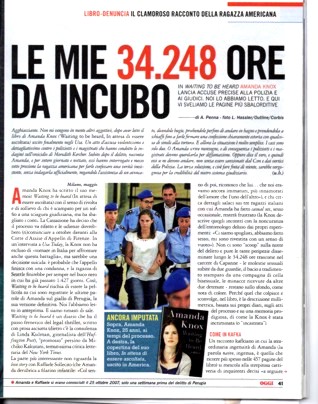
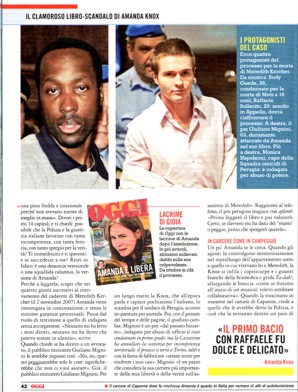
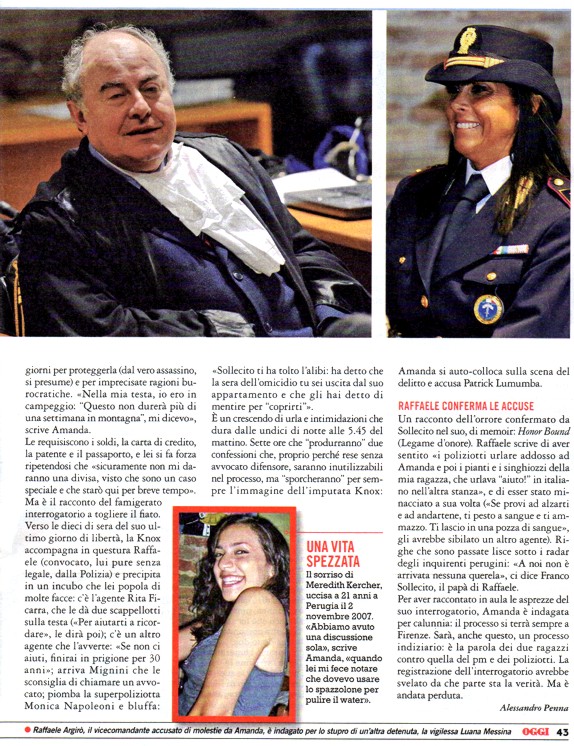
Thursday, May 09, 2013
Demonizations By Knox: She Invents An Illegal Interrogation By Mignini That Never Took Place
Posted by Our Main Posters

[The Perugia Central Police Station where Knox’s imaginary interrogation “took place”]
It is hard to imagine a more extreme form of contempt of court than Knox falsely accusing a respected prosecutor of interrogating her without her lawyer being present, and pressing her to incriminate others.
For this alone, Knox will certainly be investigated and charged. No wonder she is “scared” of returning to Italy. Apart from fears of getting up on the stand, she has lied about and falsely accused way too many people there.
1. What actually happened at Knox’s witness and suspect interviews:
Here is the true account, which has many witnesses, and then her account in the book, which has none.
Before 3:00 AM on 6 November 2007 the respected senior prosecutor Giuliano Mignini had barely set eyes on Amanda Knox.
At that point in time, she had just passed through a purely voluntary witness questioning with the police, who were actually much further ahead in questioning Sollecito and Knox’s flatmates and Meredith’s English friends.
Dr Mignini was at home asleep, but on call if the central police station needed him that night, which is how quite by chance he came face to face with Knox not long before dawn.
Knox’s latest alibi had just been collapsed in another witness interview room. Sollecito had collapsed their joint alibi almost instantly when shown phone records that proved he had just lied. He then declared their current alibi to be a pack of lies.
Told of this, Knox then floundered for a new explanation, turning finally to fingering her employer Patrick Lumumba who the police did not even know to exist until her phone record showed he did.
Police took down that statement, Knox signed it, and this at 3:00 am was the state of play.
Knox was in a waiting room and not under arrest. Mignini was required to warn Knox of her rights as a new suspect, and to warn her to do no further talking to him or anyone else around without a lawyer present.
This was especially so as Knox was inclining to babble on and on and officers were trying to calm her down. As the police had just found (and as her own lawyers later found) she can prove very difficult to stop.
This relatively brief meeting (in which Mignini made quite clear who he was, witnesses confirm) was extended to allow Knox to fine-tune her accusation of Patrick.
She shrugged off the right to have her lawyer there. Prior to this, Knox to Mignini was simply one of a whole lot of people who might be of interest, nothing more.
2. Knox’s invented version of the witness interview which never happened
This interrogation quoted from Knox’s book below is already attracting serious attention in Italy. Why? Because its just not her babbley tone, and because it never even took place.
Amanda Knox, Waiting To Be Heard, HarperCollins, Pages 90-92
[Description is of the end of Knox’s voluntary witness interview with police which Mignini did not attend; the most damaging claims are in bold]
Eventually they told me the pubblico ministero would be coming in.I didn’t know this translated as prosecutor, or that this was the magistrate that Rita Ficarra had been referring to a few days earlier when she said they’d have to wait to see what he said, to see if I could go to Germany.
I thought the “public minister” was the mayor or someone in a similarly high “public” position in the town and that somehow he would help me.
They said, “You need to talk to the pubblico ministero about what you remember.”
I told them, “I don’t feel like this is remembering. I’m really confused right now.” I even told them, “I don’t remember this. I can imagine this happening, and I’m not sure if it’s a memory or if I’m making this up, but this is what’s coming to mind and I don’t know. I just don’t know.”
They said, “Your memories will come back. It’s the truth. Just wait and your memories will come back.”
The pubblico ministero came in.
Before he started questioning me, I said, “Look, I’m really confused, and I don’t know what I’m remembering, and it doesn’t seem right.”
One of the other police officers said, “We’ll work through it.”
Despite the emotional sieve I’d just been squeezed through, it occurred to me that I was a witness and this was official testimony, that maybe I should have a lawyer. “Do I need a lawyer?” I asked.
He said, “No, no, that will only make it worse. It will make it seem like you don’t want to help us.”
It was a much more solemn, official affair than my earlier questioning had been, though the pubblico ministero was asking me the same questions as before: “What happened? What did you see?”
I said, “I didn’t see anything.”
“What do you mean you didn’t see anything? When did you meet him?”
“I don’t know,” I said.
“Where did you meet him?”
“I think by the basketball court.” I had imagined the basketball court in Piazza Grimana, just across the street from the University for Foreigners.
“I have an image of the basketball court in Piazza Grimana near my house.”
“What was he wearing?”
“I don’t know.”
“Was he wearing a jacket?”
“I think so.”
“What color was it?”
“I think it was brown.”
“What did he do?”
“I don’t know.”
“What do you mean you don’t know?”
“I’m confused!”
“Are you scared of him?”
“I guess.”I felt as if I were almost in a trance. The pubblico ministero led me through the scenario, and I meekly agreed to his suggestions.
“This is what happened, right? You met him?”
“I guess so.”
“Where did you meet?”
“I don’t know. I guess at the basketball court.”
“You went to the house?”
“I guess so.”
“Was Meredith in the house?”
“I don’t remember.”
“Did Patrick go in there?”
“I don’t know, I guess so.”
“Where were you?”
“I don’t know. I guess in the kitchen.”
“Did you hear Meredith screaming?”
“I don’t know.”
“How could you not hear Meredith screaming?”
“I don’t know. Maybe I covered my ears. I don’t know, I don’t know if I’m just imagining this. I’m trying to remember, and you’re telling me I need to remember, but I don’t know. This doesn’t feel right.”
He said, “No, remember. Remember what happened.”
“I don’t know.”At that moment, with the pubblico ministero raining questions down on me, I covered my ears so I could drown him out.
He said, “Did you hear her scream?”
I said, “I think so.”My account was written up in Italian and he said, “This is what we wrote down. Sign it.”
To repeat, Mignini was not even present at the midnight interrogation of Knox by the police, and he certainly never edged her into fingering Lumumba as is being claimed here. Knox herself did that all by herself in the presence of the police.
And she did it again and again. Emphatically.
[Dalla Vedova and Ghirga: did they illegally allow Knox to commit serious felonies in the book?]
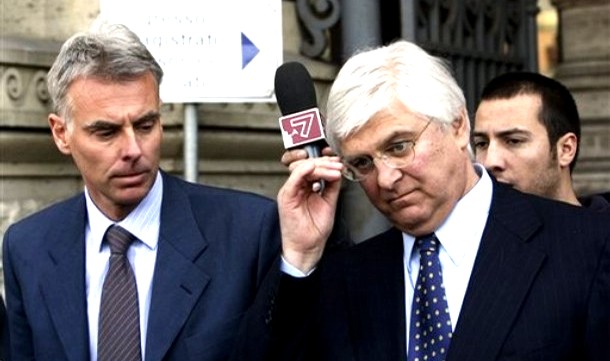
Tuesday, March 26, 2013
More Pervasive Myths We Will Nail In Our Various Hoaxes Series In Due Course
Posted by Our Main Posters

We hope you made it through those amazing Powerpoints on the case for guilt introduced in the post directly below.
We have created around two dozen other Powerpoints also. Here are all Kermit’s Powerpoints and here are all other Powerpoints.
Below are summaries of some more key and very pervasive myths which you can easily spot in today’s media in the US and UK (though never in Italy) which we will nail in depth soon in other longer posts.
The real hard truths can all already be found here on TJMK if you search for them. Please feel free to email us if you need some quick guidance.
1) That Knox and Sollecito maybe face a “retrial”
Rubbish. At most they face a re-run, done properly, of a poorly managed, legally and scientifically incompetent, and highly biased first appeal. It SHOULD look like any US or UK appeal: limited, fast, focusing only on a few points, no consultants, no witnesses, no attempt to run a new first-level trial.
2) That any such “retrial” is a case of double jeopardy
Rubbish. Under Italian law Knox and Sollecito still stand accused of murder and other crimes until the final appeal court (in this case the Supreme Court) signs off, so they were NEVER found “innocent, end of story” at first appeal level. There’s no question of double jeopardy; and the exact-same rules apply in the US.
3) That Amanda Knox was forced into “confessing”
Rubbish. This is the misleading label for her framing of Patrick Lumumba. She spilled the beans fast and vociferously (and repeatedly) after Sollecito who was being interrogated in another room sold her out and said she had made him tell lies. Interrogations were short, she had an interpreter, she was not interrogated as a suspect without a lawyer, and she had refreshments.
4) That all the DNA evidence was thrown out by Hellmann
Rubbish. Hellmann (who is now edged out in disgrace) and Zanetti were not criminal judges, and this was their first DNA case. They were totally at sea. By innuendo, two consultants, illegally appointed and ill qualified, tried to make out there was possible contamination. They proved nothing. They ADMITTED Meredith’s DNA was on the big knife and that Sollecito’s DNA was on the bra clasp. There was lots of other incriminating DNA evidence outside Meredith’s door.
5) That “the” prosecutor was rogue, satanist, and out of control.
Rubbish. The lead prosecutor at trial (Mignini) is straight as an arrow and very admired, and has no interest in satanism. His work was checked by a co-prosecutor, other prosecutors, and many judges. He is in line for a major promotion, and has no dark cloud hanging over his head. The Supreme Court TWICE came down strongly in his favor in the part several weeks, and he is about to be promoted to Deputy Chief Prosecutor for the Province of Umbria.
Final warning:
Disregard everything coming from ABC, CNN, and any Seattle TV station. They are highly biased for commercial reasons, they don’t know the case, and they have essentially been serial-lying to the American public.
Monday, February 18, 2013
Raffaele Sollecito Now Under Formal Investigation For New Crimes Apparently Unprecedented
Posted by Our Main Posters
Breaking news. The Chief Prosecutor for Tuscany Dr Quattrocchi (above and below) has taken this investigation of Sollecito behind the scenes. Dr Quattrocchi is actually under no compulsion to make any of the Perugia and Rome complaints public before his investigation is complete. He has ordered all documents removed from the public domain. This is specifically to give the defense and their PR no advantage, and to make sure those others in Perugia who are going to complain about being defamed do so without harm.
Overview
This is a contempt of court case as court officials have been impugned. This is Wikipedia’s definition of “contempt of court” under US and UK common law.
Contempt of court is a court order which in the context of a court trial or hearing, declares a person or organization to have disobeyed or been disrespectful of the court’s authority.
Often referred to simply as “contempt,” such as a person “held in contempt,” it is the judge’s strongest power to impose sanctions for acts which disrupt the court’s normal process.
A finding of contempt of court may result from a failure to obey a lawful order of a court, showing disrespect for the judge, disruption of the proceedings through poor behaviour, or publication of material deemed likely to jeopardize a fair trial.
A judge may impose sanctions such as a fine or jail for someone found guilty of contempt of court.
We may now find out much more about the equivalent under Italian law.
When Raffaele Sollecito and Amanda Knox were released at the end of 2011, the prosecution filed a Supreme Court appeal within the allotted period. This automatically meant that Sollecito and Knox still stood accused of crimes until the Supreme Court finally signs off.
Typically Italian defendants in such a legal status get good legal advice, on the lines of “Shut up and keep your heads down. We need to be the only ones doing the talking here.”
Here such advice may or may not have been forthcoming, but the public record strongly suggests it was not. In fact Sollecios entire legal team is credited by both himelf and his shadow writer Andrew Gumbel with helping. This is what Gumbel wrote in his Acknowledgments:
Donatella Donati in Luca Maori’s office gave up many hours to make the official documentation available and to present it all in a cogent order. She’s a largely unsung hero in this story and deserves recognition for her extraordinary efforts on Raffaele’s behalf. Giulia Bongiorno, Luca Maori, and Tiziano Tedeschi answered questions and made comments on parts of the manuscript.
In the same Acknowledgments Sollecito credits the following.
I was lucky to have a crack legal team who showed their devotion to the truth and, in some cases, did not even request payment. The team of lawyers and consultants included Adriano Tagliabracci, Francesco Vinci, Bruno Pellero, Francesco Introna, Giulia Bongiorno, Maurizio Parisi, Daniela Rocchi, Luca Maori, Donatella Donati, Marco Brusco, Aldo Poggioni, Delfo Berretti, Tiziano Tedeschi, and Antonio D’Ambrosio.
Interestingly, Luca Maori has already left Sollecio’s legal team, and all eyes are now on Giulia Bongiorno. Buy plenty of popcorn. Lawsuits could fly between lawyers and family.
Since the end of 2011 Curt Knox’s forces seem to have have gone full steam ahead with their own vilifications of the Italian prosecutors, police, judges, and witnesses - in fact almost anyone who had any role in 2009 in finding them guilty, or came to believe that was a fair finding. Ourselves included.
In late 2012 Curt Knox apparently invited all the most fervent of these attackers to Seattle, including Frank Sforza and Bruce Fischer, as some sort of reward for their legally very ill-advised campaign. Buy plenty more popcorn. Lawsuits could fly here as well.
Raffele Sollecito’s forces in Italy had been a lot more restrained.
But at a stroke, the shrillness of Raffaele Sollecito leapfrogged that of Amanda Knox’s forces, with the publication of his book Honor Bound by Simon and Schuster in English in the UK and US last September,
INSTANTLY the book became notorious in Italy, because excerpts were read out by an Italian reporter in New York on the national television show Porta a Porta. Raffele Sollecito’s father Francesco was on that show, and he was increasingly forced to admit a key claim in the book was invented. It simply never happened. His son made it up.
The false claim by his son that Francesco was made to repudiate - it reappears over many pages - concerned a claimed deal engineered by his family and offered by the prosecution to Sollecito.
The deal he claimed was to roll over on Amanda Knox, and if Sollecito did so, he would be home free.
Following the Porta a Porta show, the book (obtainable on UK Amazon, where many false claims are repeated in the reviews) began to make its rounds in Italy. It took some time before many official parties accused of crimes by Sollecito obtained copies and started to explore their own legal possibilities. They are apparently still far from finished.
At the end of last week, the Chief Prosecutor for Tuscany Giuseppe Quattrocchi received the first official request from Perugia, which is to investigate 12 very serious claims in the book against the prosecution and the legal institutions of Italy. The complaint nominates a number of witnesses.
The Prosecution office of Florence now has a maximum of six months to investigate whether there is a case against Sollecito and other named parties. If so, they will steer it through the hoops of the Italian process.
The potential ripple effects of this appear to us to stretch on and on. They could come to engulf both legal teams (credited in the book with helping) and all of the PR for both defendants. Sollecito’s publisher and shadow writer are specifically named in the complaint
If Amanda Knox is not let off the hook by the Italian Supreme Court late in March (the outcome we consider most likely, given the great strength of the appeal) the smart way for Knox to go in light of this could be to junk all her websites, her book, and her interviews, and throw her supporters under the bus. Plus maybe get smarter lawyers - the aggressive and inexperienced Dalla Vedova does her no favors.
Keeping Amanda Knox’s head out of this deadly new line of fire may be very late - but maybe better late than never.
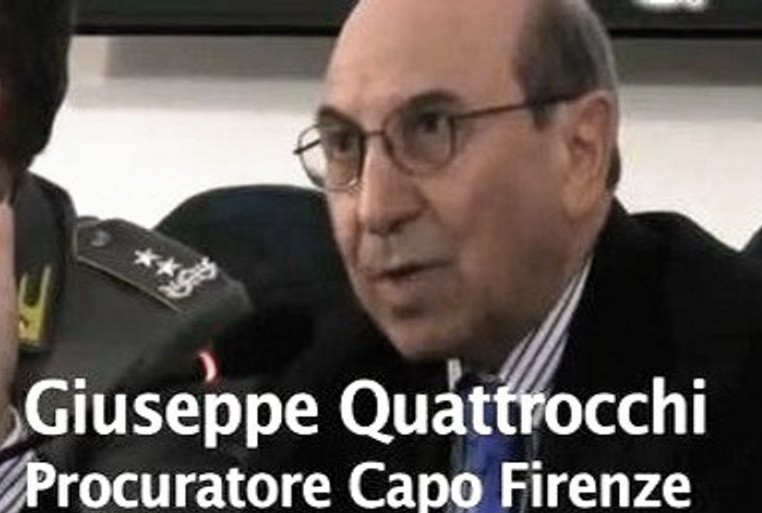
Monday, January 21, 2013
An Overview From Italy #2: Current Perceptions In Italy, Justice Perverters Fail, Mignini Vindicated
Posted by Machiavelli
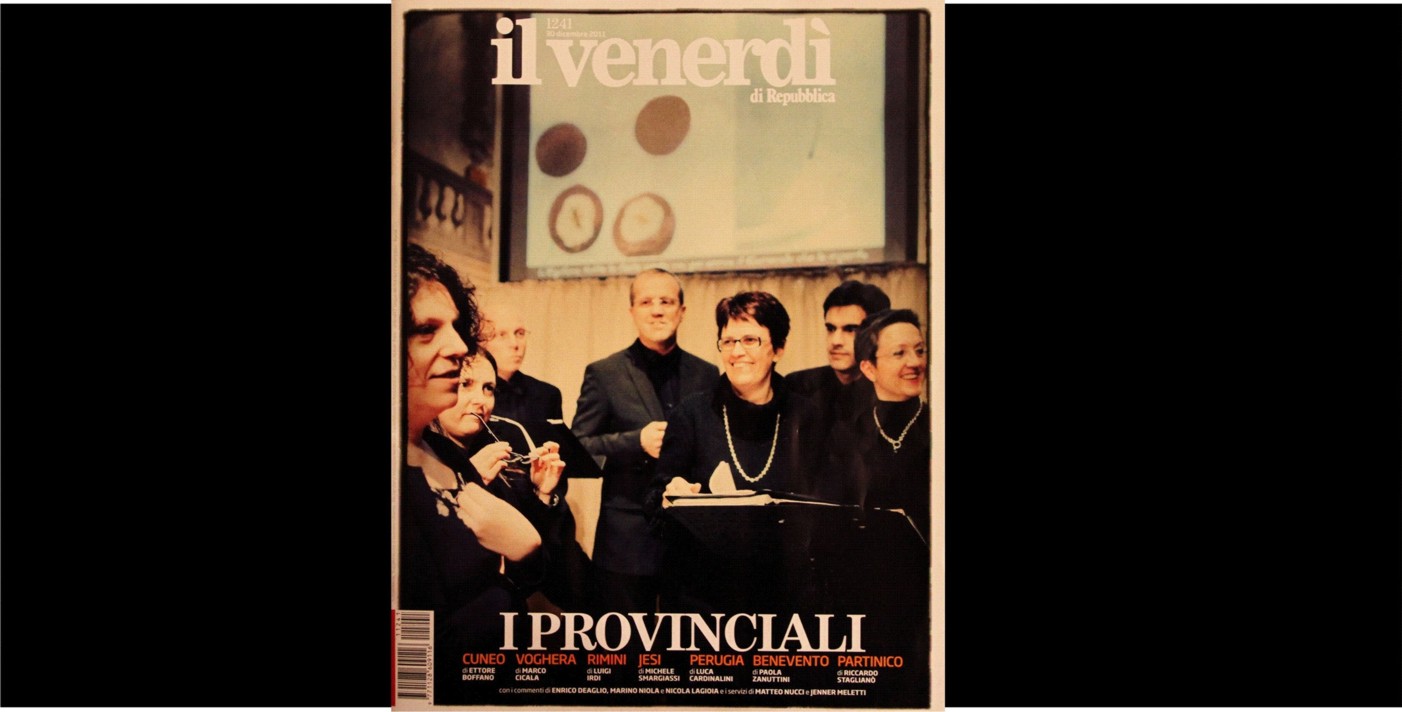
My previous report on the bad news remorselessly building here for the defense was on the Procura Generale appeal to the Supreme Court.
One year ago ““ between the end of December 2011 and beginning of January 2012 ““ there were only rare idle comments in the Italian press about the Meredith Kercher case, more or less sarcastically noting the “suspicious” circumstances of the Appeal trial. I recall how a mention of the topic was dropped into the last number of “ll Venerdì” of 2011.
“Il Venerdì di Repubblica” is the weekly magazine issued together with the newspaper “La Repubblica” (thus probably the most read magazine in Italy).
The cover theme of that week was provincialism ““ or better “the provincials” - the adjective used to assemble a sample of seven little cities (Cuneo, Voghera, Rimini, Jesi, Perugia, Benevento, Partinico), picked from different regions, and taken as examples on the theme, that is stories of “local colour”; what goes on in small “provincial places”. A few characters and stories are brought in to depict the local life of each place, and the voices of local authors adds something about the places.
The article about Perugia (at pages 62-68) was by Luca Cardinalini. In that number of Il Venerdì, having stories of “local colour” as weekly theme, there were shades of ironic tones for each city, often through the voice of local intellectuals. As Perugia is described, the Meredith trial is quickly recalled among its local stories; the reader can’t miss how this is viewed as in connection with another most remarkable feature of the city, that is Masonry.
According to Luca Cardinalini and Enrico Vaime, Masonry is called a “Specialty” of Perugia, like chocolate. Local author Enrico Vaime intends to convey the people’s perception about shady powers existing in the city, about a local environment saturated by plots and informal powers, as something behind recent strange judicial decisions such as the Hellmann verdict and the apparent dropping of the Narducci case. The widespread belief of Perugians that the Public Minister (prosecutor) is the righteous one shines through the words of Enrico Vaime.
Also notice how racism appears to be another key perception about the verdict. Quality media press in Italy has a typical style of understatement. This comment hints that it seems obvious that the Appeal was a racist verdict - and it was “expected” that they would find a way to blame the black one and the outcast.
Some of Perugian “provincialism” seems to include a very narrow localism of Perugian identity: a person from Orvieto is reported to be called “a foreigner” ; but this is because the cultural viewpoint is based on the assumption of a personal knowledge of all people. In among this, there is Vaime’s knowledge about how rooted Masonic tradition and power is in the city, in a scenario of “brotherhoods” and “tribes” (the article includes a photo of the most known “Masonic” monument in Perugia: the gryphon or griffen ““ the emblem of Perugia ““ grabbing a toppled Pope’s Tiara in a sign of rebellion).
The report by Vaime is objectively correct : the concentration of members of Masonic lodges in Perugia is the highest in the world, about 5 times the national average of Italy (which is anyway very high).
In Vaime’s wording decent people in Perugia are ‘Christians’ or ‘Communists’ ““ these are the names he uses to address the main categories he sees as “good” people, two transparent moral systems. He devolves skepticism toward the less transparent allegiances, the murky and informal connections to powers.
I believe these perceptions from one year ago, in this colorful article about Perugia, should be most interesting to the readers of this site.
The first part of the article on Perugia is not that interesting - it speaks mostly about a local character named Ivano Massetti, nicknamed “Savonarola of Umbrian football”, the director (“boss”) of a local TV network and leading showman of his own soccer talk show. I skipped this first part with depictions of local folks, and get to the point at p.66 where the Kercher case is first mentioned.
This is my translation of the article from this point:
[”¦](p.66 line 17):
As Enrico Vaime ““ a 100% Perugian, a writer, and among many other things fiercly provincial ““ already knows: “Only in Perugia do you hear people saying “actually Tizio [random guy] was not a native from Colombella, but from Piccione”, which is three times further”. And when his grandfathers (farther of his father) bearing the same name Enrico Vaime, moved his formal place of residence [to Perugia] from Spello, on the official documents they wrote “emigrated to Perugia and married to a foreigner from Orvieto”.
The roots are extremely deep. “Still today” Vaime says “when I say to my family “we go back home”, I mean here, in Perugia, where I have not owned a house for decades. And I still call the roads and shops with the names they had when I was a child, even if now the owners are foreigners, from Shangai or, as I say, from Terni”.
Vaime is cross with the bad reporters who described Perugia, in the Meredith murder case, as a capital of corruption and vice: “An invasion of charlatan journalists who, as they believed they were visiting a remote and lost province, they painted it as a sort of Chicago on the Trasimeno Lake”.
[The fact] that no Perugian was involved in that sad story, to them that was an irrelevant detail. And the trial ended just the way many Perugians expected: a black guy first wrongly put in jail, another black one convicted, the two white, good-looking, wealthy and well defended young people, free.
So it was that the Public Minister Giuliano Mignini became a target. He’s a Perugian whom the Perugians know as the dominus of the other judicial case ““ this also is, yes, entirely local ““ about which everybody talks and knows, but always in a low voice: the death of doctor Francesco Narducci, the one suspected of having ties to the crimes of the Monster of Florence. From the judicial point of view that was - by half ““ just another hole-in-the-water [a failure] for which some critics have hastily put the blame on some alleged lunacy of the public minister.
But”¦ however”¦ meanwhile, this [Naducci] corpse-swap was indeed found to have been for sure, a kind of unique case in the criminal history of the country. And, for what concerns the recent acquittals of those characters involved in this death, well, after almost a year and a half we are still waiting for the verdict motivations. All of the suspects were esteemed high-class professionals. That’s a perfect mix of strange deaths, sex, lead-astray investigations, and Masonry; this is in the city with the highest number of Masonic lodges in Italy.
Vaime sighs: “Masonry is something alien from me, but I have many friends who are in it. In Perugia it works as a compensation chamber for various powers, but also as an effort for the surge of the spirit to many decent people. Masters, masons and “33”, but all of them decent Perugians”. Masonry is considered a local specialty, just like the bruschetta or the Etruscan arch.
“One day you find out that that mediocre employee of your acquaintance, or the one who performed an incredible career in the public administration or in politics, is a “˜son of Horus’. Then you either laugh, or you slap yourself on the forehead just like saying to yourself “Wow! [how could I ] think about it!”. “That travet* [*a generic mediocre opportunist employee], too”
Vaime says “to me it is a strange Perugian, with little interest for the Egyptian god compared to his covet for entering inner circles of a certain world. Their internal motivation is “I want to see how the lords sit at the table”. But in there [Masonry], you see, there are also good Christians and good Communists; as has always happened in this province, which has the art of living together in its genes”.
[”¦. ]
This month ““ Jan 2013 ““ the Italian press returned to the topic of the case again in a few brief articles. This time it was because of Sollecito’s book.
After Maurizio Molinari’s report from New York on the book in September, and the busting by Bruno Vespa on Porta a Porta of Francesco Sollecito, who ended up openly contradicting his own son’s statements, another hint appeared in the local press about what is cooking up backstage.

This article in Perugia Today has a neutral take, but the same understatement and kind of vagueness as it anticipates that something very likely will happen.
What I find most delightful is the quotation marks in the title around the word “author” ““ journalist Nicola Bossi doesn’t believe for a moment that Sollecito actually wrote the book:
Meredith Case: “author” Sollecito at risk of criminal lawsuit
The recounts about an alleged negotiation in order to pin the main charges on Amanda Knox, and unproven violence by the Perugia Police are under target. Mignini is considering criminal lawsuit.
Written by Nicola Bossi ““ Jan 4. 2013
The Meredith case is not closed, and this despite books and movies almost tend to drop it after the acquittal in second instance of Amanda Knox and Raffaele Sollecito - who were convicted in first degree for the murder of the English girl that took place in Via della Pergola.
On upcoming March the 25th the Court of Cassation of Rome will have to decide on the request for a re-opening the trial, submitted by the Procura with the authorization of Public Minister Giuliano Mignini.
In the environment of the magistrates there is confidence about a [guilty] verdict that many ““ in Italy and in the USA - have heavily attempted to discredit. But from the same environments around them, they talk about a greatly serene Mignini making assessments about the next strategic moves, following the attacks directed against him ““ and against those in Law Enforcement who cooperated with him ““ contained in the book by Raffaele Sollecito.
An upcoming criminal defamation lawsuit is becoming more and more likely every day, especially about some particular paragraphs. The material published by Sollecito has already resulted in discussions and clamor above all about claimed negotiations [with the prosecution] aiming to shift the blame onto Amanda alone, to be rewarded with his immediate release.
But there are also accusations against the Police about violence during his interrogations. “If you dare get up and walk, I beat you up in a bloody pulp and I kill you. I leave you in a pool of blood”. This is what you read in the book “˜Honour Bound’ issued in the US, as what Sollecito attributes to the Perugian officers.
“They wanted me to lie so they could frame Amanda”: this is the premise of the claimed negotiations claimed to indirectly involve Mignini too, which he always denied. Allegedly this would have been enough to get [Sollecito] out from prison soon, leaving the American woman in trouble.
So, these are grave accusations which Mignini apparently does not intend to let go unpunished. The criminal lawsuit is likely to be filed earlier than the date of Cassazione [25 March].
Another small piece of news is this article below published in Leonardo and written by Valentina Cervelli:
It seems basically a “commented” version of the Perugia Today article. Cervelli adds a few polite lines on her own thoughts in this piece, published on the Bbooks page of Leonardo,it; this is my translation:
Is Raffaele Sollecito going be sued soon for “Honor Bound”?
By Valentina Cervelli - 6. Jan 2013
Are there troubles in sight for Raffaele Sollecito? His “Honour Bound” book is going well in the United States in terms of sales, but here in Italy it might be soon result for him in a lawsuit for defamation by the Law Enforcement forces and by the Public Minister Giuliano Mignini.
As we know already, in Honor Bound ““ My journey to hell with Amanda Knox and return Raffaele Sollecito has reconstructed the whole judiciary story from his point of view, telling in his autobiography what [he says] is his own truth.
On March 25 Cassation in Rome will decide on the [prosecution] request for the re-opening of the trial submitted by the Procura authorized by Giuliano Mignini, after the acquittal in the second instance of the two main accused, Sollecito and Amanda Knox.
The young woman has returned back to her country and we bet it’s going to be difficult, if not impossible, to get her back in our country even in case of retrial after Cassation and a possible conviction. But lets leave aside this possible dispute and lets focus on the book. In Raffaele’s book Mignini is iimplicated because he reportedly comes out discredited. In the material published by Sollecito in his book he even talks about alleged negotiations in order to blame Knox alone, obtaining in reward a quick release.
And what about the allegations of Police violence during interrogations? Of course we don’t get into the merits, but it seems obvious that parties that may be considered offended would tend to launch a counter-attack to defend their dignity and their work. At the moment no lawsuit has been submitted. But with much probability that will be done before the decision of Cassazione.
By now we can only wait for the publishing of the book in our country, in order to assess with our minds what Raffaele Sollcito has written and the “hot” material published in his made-in-the-US autobiography.
By the way; one thing Valentina Cervelli might get wrong is the purported good sales of Sollecito-Gumbel’s book.
The Amazon.com site is reliable as quick indicator of a product’s success; the price of a new copy of “Honor Bond” on Amazon.com is now $ 3.51 (last week it was 3.76; the cover price is $ 24). It suggests sales are not quite as expected. The drop speed is significant if you consider that the book has been out for only four months.

[Above: the Florence Palace of Justice]
While many honest magistrates seem to be working in Florence, there is still some strange behavior by one or two people in the Florence prosecution office.
Iin particular by the chief prosecutor there were some unexplainable decisions. As people reading this site know, Giuliano Mignini and Michele Giuttari were convicted (of some of the charges) in the first degree trial in Florence.
The motivations document was disconcerting because: besides the proof of their innocence on the main charge, what was described as the evidence on the remaining charge constituted extremely weak and vague arguments for what was claimed about Giuttari, while they were totally non-existent about Mignini.
In the second instance appeal as we know the court completely crushed the trial case.
The case against them collapsed not because of a technicality, as the FOAs falsely claimed. In the figment of their imagination the Knox supporters erroneously thought that the Florence court had an “option” to overturn the case, to find Mignini and Giuttari innocent, but that they instead decided to pass the judgment on to some other tribunal.
The pro-Knox believers are probably also ready to believe blindfolded that there was some kind of evidence against Mignini.
The Knox believers are wrong. What in fact happened in Florence is something almost unique in a judge’s career. The first remarkable event was the decision by the Florence court of nullifying the first degree verdict. They did not simply overturn the verdict (neither change, or “reform” it as we say) since an overturning would imply acceptance that a previous verdict actually existed and was legitimate.
The cancellation was in fact an in limine act about the validity , which does not require an assessment about it correctness. The court went way beyond. In fact they nullified the whole trial, not only the previous one in terms of judgment, but also the preliminary hearing, and the indictment; and even the request of indictment.
It is a legal outcome not comparable to a simple change or overturning because it is a ruling that the whole proceeding was illegitimate from the very roots. The investigation itself of Mignini and Giuttari was declared illegitimate.
If elements were found for the opening of an investigation, the prosecutor would be entitled to carry on their duties, though the investigators should be from another territory. This is important because the Florence court found evidence that people from the same office were involved in cases against Giuttari and Mignini, both as offended parties and as prosecutors.
Because of a basic conflict of interest, the local prosecutors were incompatible and the Procura of Florence had no jurisdiction. Not even Genoa would be compatible.
Florentine prosecutors therefore had no right to bring cases against Mignini and Giuttari. The investigation files now must now be sent to the competent jurisdiction ““ where they should have been sent from the beginning ““ which is Turin; there other legitimate prosecutors will decide if and how there is anything to investigate about, and if there are any charges to bring against anyone. The Florentine trials should have never taken place. The court ordered that the legitimate investigators are the Procura of Turin.
In addition, they also ruled that the court of Florence would be an incompetent jurisdiction in any further possible case that stems from that investigation: since the competent prosecution is Turin, in case elements for the indictment of anyone for any charge are found, in the future, everything should go to a court in Turin ““ this, only if there will be any charge to bring to court .
This decision in Florence was a total debacle for the Florence prosecutors. It is in fact “politically” much worse than an overturning of a verdict. It is not just a like a different conclusion on the merit, it is the decision to take away even the investigation from them, a kind of implicit censure of their work as highly illegitimate.
But at this point in the procedings, something even worse and even more strange happened. The Procura of Florence did something even more unusual, in fact unprecedented as far as I know.
Apparently the Florence prosecutors are not happy at all to pass the investigation file on to Turin. For some reason they seem instead to want to do unnecessary and irrelevant hard work instead. The Florentine prosecutors impugned the decision and revisited this at the Supreme Court against the Florentine judges.
This step is almost unheard of because the decision of the Florence appeal court is of a type that manifestly cannot be impugned at the Supreme Court. The recourse is obviously going to be declared inadmissible. If that submission was done by a private citizen, they would get a heavy fine for that.
Here it is a power in the Florence judiciary branch making this inadmissible move; for unknown reasons.
I’d like to know the real motive behind the latest Florence move, the only effect of which can be a waste of time (and money), a delay, of at least one or maybe two more years, which only makes the failure of the whole proceeding against Mignini and Giuttari more likely due to lapse on an expiration terms.
I say “I’d like to know” but in fact one motivation stands out as obvious: the whole proceeding against Giuttari and Mignini, from the first bringing of the charges at the lower courts, appeared as having a wasting of time among its purposes.
One practical effect - maybe a practical purpose - of pushing the charges against Mignini, was taking the file about the Monster of Florence case links with the Narducci case away from Perugia. By this move, the Florentine prosecutors managed to factually put their hands on the Narducci-MoF file and remove it from the investigating powers in Perugia.
Another effect of this was delay. Now this latest move looks as if its purpose were to delay, as much as possible, the transfer of the legal documents to Turin.
What is the ultimate event that, by all this, they seem to be seeking to delay? I can’t know for sure, I can only guess; in fact, I have only one answer, which also stands out as something obvious for those who know a bit of the backstage:
Giuliano Mignini is not an ordinary magistrate, he belongs to the Anti-Mafia Territorial Division of Umbria, and recently was selected for a further promotion by the Supreme Council of Magistrates.
In fact what is delayed is the advancing of Mignini’s career: in fact he has been already promoted to a directive function; but, by the rules, his taking the post was frozen while awaiting the outcome and conclusion of the Florentine prosecution.
Prosecutor Mignini is de facto already functioning as a prominent Magistrate in Perugia and considered as such; but formally he has not been given the directive power. Several people ““ among them Spezi and a number of his journalist friends, but possibly also other much more important people too ““ are likely not at all eager to see Mignini awarded further power.
About the latest endeavor by Raffaele Sollecito, who became liable for criminal defamation by writing false allegations about Mignini and others in his book, I expect - as logically unavoidable ““ that several powers and subjects will basically have no option but taking legal against him.
There will be a strategic necessity to doing this in order to prevent extradition issues in the future, but also, above all, on principle, because Sollecito made false claims about public institutions that needt to have their names cleared. Considering the kind of allegations against the judiciary as an institution, and considering that Mignini is a judge of the Anti-Mafia Division, this is the kind of lawsuit that I see as likely to be submitted on a national level, in Rome.
If that is the case, it would not be the only strange thing that the courts of Rome will deal with.
It seems like there is a kind of “curse” on proceedings related to the Narducci case. All sections of the Supreme Court which have been asked seem to have attempted to declare themselves “˜incompetent’ about re-opening the cases related to the Perugian doctor. The Cassazione is a huge office with a hundred judges working there, but maybe not so many of them are eager to deal with this case.
This could be only a coincidence. It only brings up to my mind, through a free association of thoughts, a more generic question ““ a personal question of mine ““ that is whether the words “Masonry” and “Politics” have an echo in Roman corridors too.
*****
Finally I want to add another significant piece of Italian news.
The news a week ago was that the Procura of Florence is investigating a possible corruption/mafia plot involving construction enterprises and politicians that revolves around the building of a new high speed railway in Florence.
Some 31 people are being investigated and among them is the former governor of Umbria. A huge drilling machine ““ nicknamed the “Mona Lisa” ““ used to dig subway tunnels in Florence was sequestrated by the Procura.
In the last couple of years Perugia’s prosecution office had a main role in fighting political corruption, but it seems that the Florence Anti-Mafia division is also active, just as it was in the times when the prosecutor Vigna worked with them.
Vigna was the one who first evolved the “secret sect” scenario in the Monster of Florence case, raising unexpected problems among the Procura staff.
Wednesday, December 12, 2012
Simon & Schuster Seem To Be Seriously Rattled Over Lack Of Due Diligence On Sollecito’s Book
Posted by Peter Quennell

See this emailed exchange which took place late today.
What Simon & Schuster’s agent is complaining about was a chronological reordering (behind the scenes and not linked to from the front page) of these many corrections here. Our Kindle and hardcover copies were legally purchased. Simon & Schuster put about 1/4 of the book on the front of their own website, and Google Books also carries about 1/4 of the book to read free.
Admittedly, our corrections may have been quite a shock. However, we didnt cause the book sales to tank. All of our past posts on Raffaele Sollecito’s book can be seen here.
*******
Mr Eraj Siddiqui
119 South B Street Suite A,
San Mateo, CA 94401
Dear Mr Siddiqui
Thank you for your “Verified DMCA Removal Request from Attributor” copied below.
The book you refer to appears to contain up to 30 instances of criminal defamation under Italian law and literally hundreds of wrong and injurious statements that are hurtful to many fine officials in Italy.
We have full legal rights to point out the myriad mistakes in the book. In fact a defamation of a prosecutor in the book has ALREADY been admitted on Italian national TV by the writer’s own father in Rome.
That Simon & Schuster apparently failed to do their legal and factual due diligence on the book prior to publishing seems to us to be absolutely nobody’s fault but their own. They are hardly new at this game.
Nice try, but sorry, no cigar.
Peter Quennell
*******
Dear Sir/Madam,
I certify under penalty of perjury, that I am an agent authorized to act on behalf of the Rights Holder identified below, the owner of certain intellectual property rights in the Work(s) identified below.
I have a good faith belief that the information contained in this notice is accurate, and that the page or material listed below is not authorized by the Rights Owner, its agents, or the law for use by the individual(s) associated with the identified page listed below or their agents.
To the extent that the Digital Millennium Copyright Act, the European Union’s Directive on the Harmonisation of Certain Aspects of Copyright and Related Rights in the Information Society (2001/29/EC), and/or other laws and regulations relevant in European Union member states or other jurisdictions apply to your service, if at all, I HEREBY DEMAND THAT YOU ACT EXPEDITIOUSLY TO REMOVE OR DISABLE ACCESS TO THE PAGE(S) OR MATERIAL(S) at the Infringing URL(s) identified below.
Note that in some cases the pages/material may have been removed after the sending of this notice but prior to your review.
My contact information is as follows:
Organization name: Attributor Corporation as agent for Simon & Schuster Inc.
Email: .(JavaScript must be enabled to view this email address)
Phone: 650.306.9474
Mailing address:
119 South B Street
Suite A,
San Mateo, CA 94401
Nothing contained in this letter or in any attachments constitutes a waiver or relinquishment of any right or remedy possessed by the Rights Holder, or any affiliated party, all of which are expressly reserved.
My electronic signature follows:
Sincerely,
/Eraj Siddiqui/
Eraj Siddiqui
Attributor, Inc.
*** INFRINGING PAGE OR MATERIAL ***
Infringing page/material that I demand be disabled or removed in consideration of the above:
Rights Holder: Simon & Schuster
Original Work: Honor Bound
Infringing URL: https://truejustice.org/ee/index.php?/tjmksollecitosbook/P0/
Infringing URL: https://truejustice.org/ee/index.php?/tjmksollecitosbook/P5/
Infringing URL: https://truejustice.org/ee/index.php?/tjmksollecitosbook/P10/
Saturday, October 20, 2012
Exploding Nightmare For Lawyers Of The Defense: Torrent of “Mistakes” In Sollecito’s Hapless Book
Posted by Sara
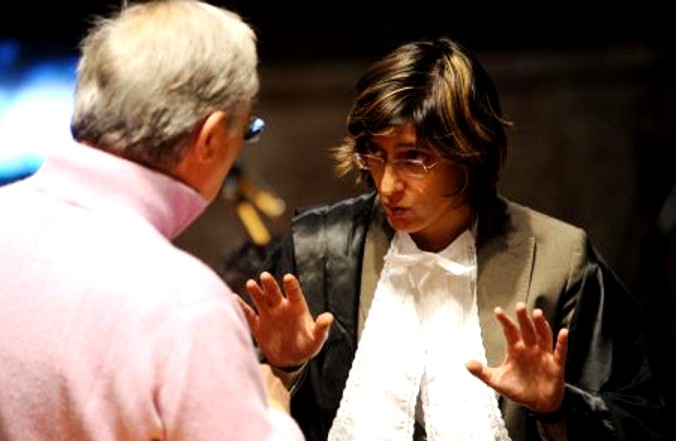
More and more and more wrong facts and libels are being turned up in Sollecito’s pathetic book, both by us here and by an irritated officialdom in Rome and Perugia.
Amanda Knox is rumored to perhaps be mentally unstable and figuratively locked in the attic in Seattle. Now Sollecito seems to have been disappeared back in Italy for his own good as well.
Sollecito’s own lawyers (who have in the past threatened to walk) and his own family have already thrown him to the wolves on Italian TV over just one highly libelous claim and there are an estimated two dozen more still to surface.
Not really a good idea to write a shrill “I’m the real victim here” book unchaperoned, when you have the smug mentality of a 12-year-old. The facts strongly against you. A very bright prosecutor. And a ghost writer whose slobbering over a laughably fictional Sollecito suggests he has a something of a boy-crush.
Raffaele Sollecito has made many stupid claims in his book, but perhaps none is so obvious and more idiotic than his claims about the “lost” emails.
What is it with this guy and the emails? He seems to think (or perhaps, thinks that the readers are stupid enough to believe) that if a computer or a hard drive is destroyed, all the emails in it are lost as well. Come on already, surely they taught him the mechanisms of email in his computer classes.
Look at his statements regarding emails. In chapter 2 (Love and Death) of his book, he describes the morning after the murder -
I’d been up several times in the night””listening to music, answering e-mail, making love””and wanted only to go back to sleep
Right, so he got up many times in the night to answer e-mails. You’d think that this would be his biggest alibi for the night of the murder, right? No, wrong. Raffaele could not prove his alibi because, in his own words -
I did not yet know that the Polizia Postale””supposedly experts in handling technology issues””had seized two of my computers along with Amanda’s and Meredith’s and somehow wrecked three of the four hard disks while trying to decipher them. The bottom line was that the damaged disks were now deemed unreadable. That left just my MacBook Pro to provide an alibi for the night of the murder.
But modern emails DON"T EVEN RESIDE on local hard drives unless one DELIBERATELY downloads them. And even if one does (and hardly anyone ever does) there rarely is reason to completely delete the original, and here there seems about zero reason to do that.
And even if the original IS deleted Facebook and email services have shown under legal pressure that they maintain complete backups going back many months. No way Sollecito’s supposed emails on the night could have been made to simply no longer exist.
Again, when he talks about Amanda and Meredith’s friendship, he says -
If either Meredith’s or Amanda’s computer had survived the police examination, there might have been photographs, emails, and other evidence to point to a more meaningful interaction
Here we go with the elusive emails again. Will someone explain the point of email to this guy? What difference would the local computers surviving or not surviving make to any emails residing on his host’s servers?
He actually has the nerve to criticize the Polizia Postale’s technical competence after making a statement to the effect that he and Amanda could not retrieve their emails as the hard disks were damaged.
Whether the hard disks were destroyed or not, whether it was the Polizia Postale’s fault or not is hardly important here. Admittedly, Amanda is not a “technical genius” (After all, she does not know how to delete messages from her sent items).
But what is stopping this resident technical genius from simply accessing his email box from some other computer or iphone, and printing out a copy from his sent items? Why doesn’t he ask even one of the happy recipients of his emails - by the way, who were they? - to forward it back to him?
Did all of them delete his mails from their in boxes and trash too? Even if we defy all logic and accept that they did, what’s stopping at least one of them from coming forward and testifying that they received a mail from him that night? Did all of them get selective amnesia at the same time too?
Similarly, if any emails that proved the “close friendship” between Amanda and Meredith existed wouldn’t they still be retrievable from Amanda’s mailbox? She could have printed a copy any time. Did she go around deleting all of Meredith’s mails the minute they arrived as well as her own replies to them, and clearing her trash box and all her host’s backups as well, just to be doubly sure they can’t be retrieved?.
Ok, let’s say the emails were deleted. What about the photographs? If there had been any photographs that would establish their “close” friendship, wouldn’t they be there on the camera or phone from which they were taken? Or wouldn’t either Meredith or Amanda have sent them to someone or posted them on their Facebook?
How did EVERYTHING vanish without a trace? If neither of them ever sent the photos to anyone or posted them online anywhere, or even kept them on file, you really have to wonder what was the point of taking them at all.
No one is claiming that Amanda and Meredith were at loggerheads all the time, they might even have gotten along initially. Meredith was not a person who judged people harshly. By all accounts, she did try her best to get along with Amanda, trying to include her in outings and defending her when she got into trouble.
It was Amanda who pulled away saying she wanted to socialize only with Italians. But the fact is that there were clashes and there were differences between them. Trying to make out that they were the best of friends by claiming the destruction of non-existent proofs is not only unbelievable but also utterly stupid.
Like our main poster Hopeful summarized it: this claimed computer genius has never in four years been able to prove he sent an email? Ridiculous.

